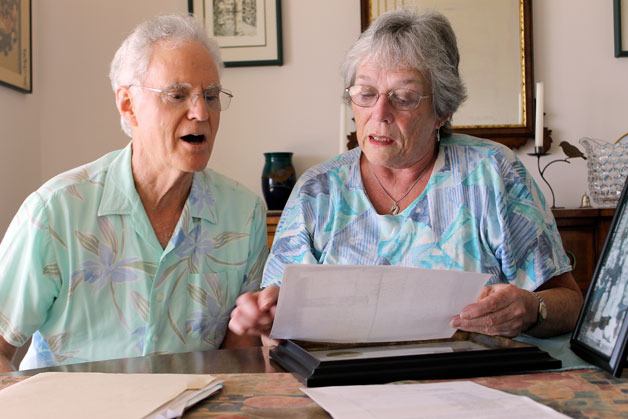With some hard-nosed research, a healthy dose of persistence and a little bit of luck, just about anyone can discover their genealogical roots. At least that’s what former Genealogical Society of South Whidbey Island members Bob Richardson and Maureen MacDonald say.
Along the way, people can also glean deep insight into the lives of their ancestors and the ordeals or lifestyles they experienced at the time.
The pair has made significant progress in discovering their lineage, efforts which they said were helped by the knowledge they are equipped with thanks to the genealogical society. The society is dedicated to furthering genealogical research by promoting interest in family history and preserving records, the society’s website says. It meets on the second Monday of every month from September to June at around 12:45 p.m. at Trinity Lutheran Chapel in Freeland.
MacDonald, a Langley resident and former president of the society, has traveled back the furthest in time of the two: to 800 AD.
She discovered the connection while researching clues in New England. Many English settlers in New England, some Puritans and some Pilgrims, had royal backgrounds, she said. The background related to her ancestors is the family surname St. John, though it is a distant connection and not a direct relation. In her research, she also found she was related to Samuel Prescott, a member of congress in the late 1700s. She said Prescott died while walking to a congressional meeting in the midst of a snow storm, which she said provided interesting insight to what the times were like.
“There’s little interesting things, tidbits,” MacDonald said.
Richardson, a Bayview resident, said his research took him back 14 generations to 1620. The family trees that are associated with the number of different relatives was mind-boggling to discover, he said.
“When you go back 14 generations, you have I think at least 8,000 grandparents all living in 1620,” Richardson. “Each one of those provides you with 1/8,000th of your DNA, on average.”
Much like Richardson, MacDonald said she was drawn to the research because of her inquisitive nature.
“I have an innate curiosity about anything and everything,” MacDonald said. “I have lots of questions for anybody who will listen.”
MacDonald said the first step was starting with a census, a record that has been taken every 10 years in America since 1790 and identifies the population.
“They’re not perfect records, but they certainly do give a lot of clues,” MacDonald said.
MacDonald said the records helped identify the migration and immigration of her ancestors, and from there she continued to follow whatever trail she could find. Each step taken opened a plethora of new routes to take, she said, which is part of the thrill of discovery.
“In genealogy, when you get one answer, you then have 10 more questions,” MacDonald said.
Mary Sue Kriefall, a past president of the society, shared MacDonald’s enthusiasm.
“Each thing you discover, it gives you a happy feeling,” said Kriefall, a Clinton resident.
Perhaps one of the more startling –– or fascinating, depending on your perspective –– was a discovery from within the society. Kriefall said among the 100-or-so people who are part of the society, several people were related through ancestors in England.
“One lives right across from the other,” Kriefall said.
Kriefall said discovering one’s family roots helps find out who you are and the strengths and weaknesses your ancestors had.
“It also gives you something to pass on to your children and grandchildren,” Kriefall said. “We’re the link between the past and the future, and if we don’t investigate why we are the way we are, then our kids are going to have a harder time doing that.”
Richardson and MacDonald encouraged those who are interested in researching their genealogy to attend the society’s meetings, where tips and tricks of the trade are openly discussed and provided. To find out more about the society, visit www.gsswi.org



